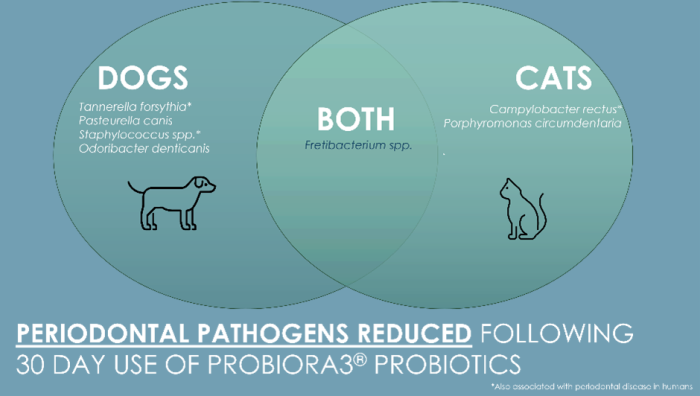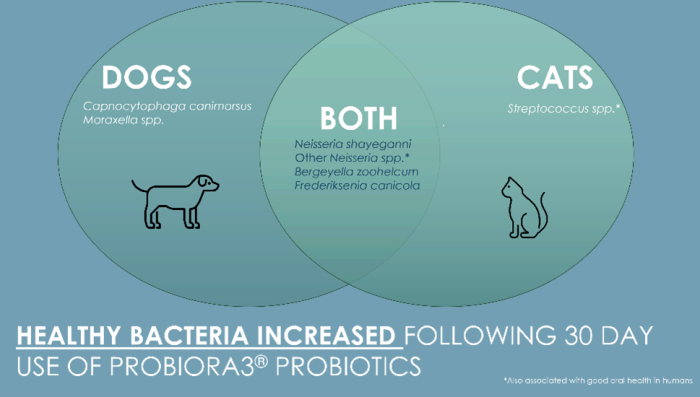ENJOY AN EXTRA 10% OFF YOUR FIRST ORDER
When you subscribe to ProBioraHealth.com emails
February 4, 2025
Oral health is just as important for pets as it is for humans, yet maintaining a healthy balance of oral bacteria can be a challenge. Issues like bad breath and gum disease are common among pets, and many pet owners struggle to find effective, easy to implement solutions.
That’s where ProBiora probiotics come in. ProBiora for Dogs and ProBiora for Cats are formulated with a patented probiotic blend, ProBiora3®, that has been clinically proven to support gum and tooth health in humans (link to the Knowledge Library here). These probiotics are specially formulated to target the oral microbiome by reducing harmful pathogens and promoting the growth of beneficial bacteria species. You may be thinking, “I know ProBiora benefits the human mouth, but isn’t my pet’s mouth different?” The short answer- yes! But many of the oral bacteria that cause disease in human mouths are the same as in pets, like Tanerella forsythia and Porphyromas gingivalis, both of which cause periodontitis in both humans and pets.
ProBiora Health recently conducted a study investigating the effect of ProBiora for Dogs and ProBiora for Cats on the pet oral microbiome. Volunteer participants swabbed their pet’s mouth before using ProBiora and after 30 days of use to see how the bacterial community changed when ProBiora was included in their pet’s daily diet. A total of 15 animals were evaluated as part of the volunteer based study- 13 dogs and 2 cats. Take a look at some of the exciting findings below:
Pathogen Reduction: A Key Benefit of ProBiora
Several harmful bacteria in the oral microbiomes of both dogs and cats were reduced following 30 days of ProBiora use (Figure 1). These included:

Figure 1. Venn diagram of oral pathogens reduced following 30 days of ProBiora for Dogs and ProBiora for Cats use.
Growth of Beneficial Bacteria: A Positive Shift in Oral Microbiomes
Not only did the levels of harmful bacteria decrease in both dogs and cats, but the study also found substantial increases in the levels of healthy bacteria, which are essential for a balanced and healthy oral microbiome.

Figure 2. Venn diagram of commensal oral bacteria increased following 30 days of ProBiora for Dogs and ProBiora for Cats use.
ProBiora for Dogs and ProBiora for Cats Improve the Oral Microbiome in Dogs and Cats
The results from this 30-day study demonstrate that ProBiora for Dogs and ProBiora for Cats can improve oral health by reducing harmful bacteria and encouraging the growth of beneficial species in the oral microbiome of pets. For pet owners looking for a natural, easy-to-use solution for their pets’ oral health, ProBiora presents a promising option.
This study does have a few limitations. As a volunteer based study, a total of 13 dogs and 2 cats were included, which does not allow detection of statistically significant differences between groups. Instead, the total abundance of bacteria was evaluated and assessed before and after using ProBiora to determine increases or decreases in pathogens and beneficial bacteria. Additionally, our amazing pet parent volunteers continued their normal feeding regimens while supplying ProBiora once per day; we did not control for factors like food type. ProBiora plans to conduct additional studies where we can control these factors, but the results from this 30-day study are promising, and strongly support the use of ProBiora for your pet’s oral health.
By incorporating ProBiora into your pet’s daily regimen, you can help ensure their oral health is supported in a safe and natural way. Incorporating ProBiora into your pet’s daily routine is a simple and effective way to support their oral health without any hassle. With its easy-to-use format—just one scoop or packet per day added to their food—ProBiora is a win for pet parents looking for a natural and convenient solution to keep their pets’ mouths healthy.
For more information about the methods used in the study, please contact info@probiorahealth.com.